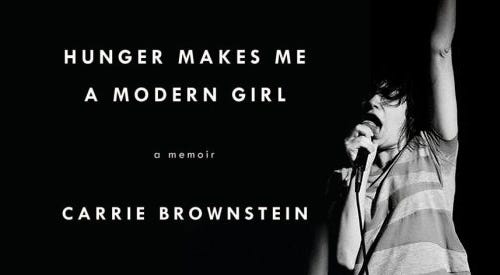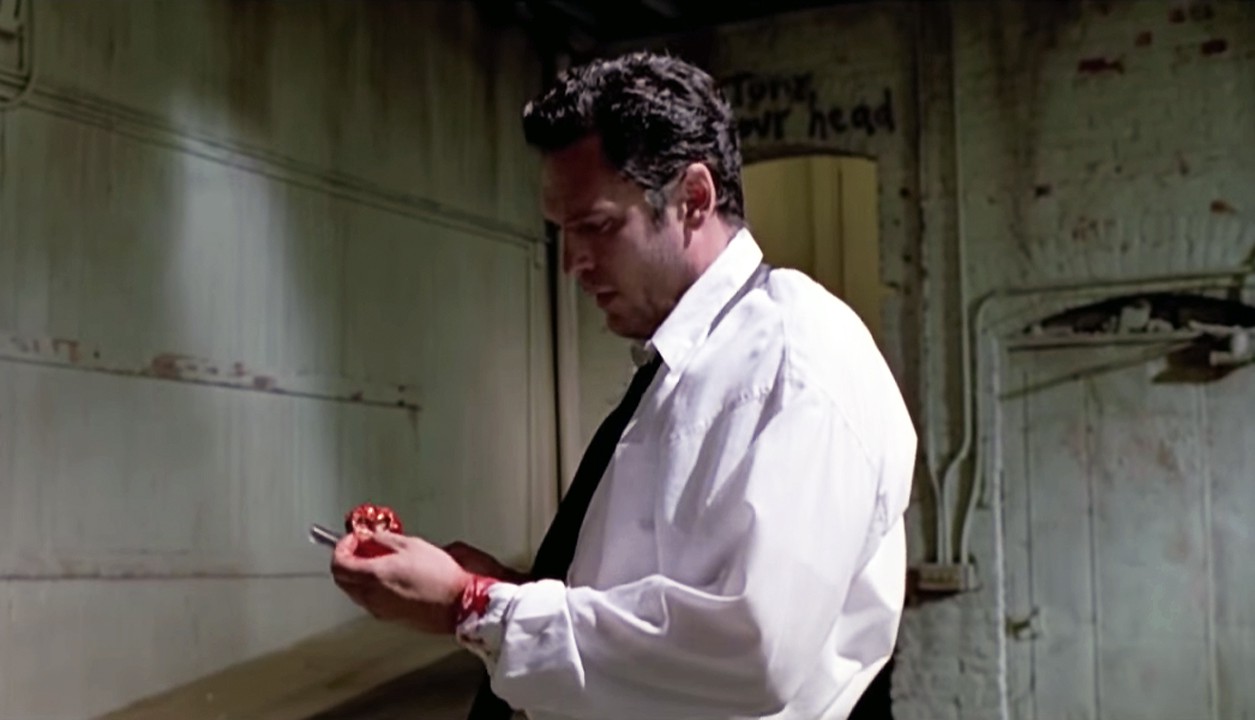Books & Culture
Permission to Immerse: Hunger Makes Me a Modern Girl by Carrie Brownstein

by Emily Kovach

Hunger Makes Me a Modern Girl covers an important period in modern indie rock history — the 1990’s rise of the Pacific Northwest brand of alternative rock and the riot grrrl movement — which Carrie Brownstein is able to describe with a refracted “I’m inside the fishbowl” perspective. Brownstein helped build and ignite that movement, and now as a sort of (beautiful, forever young) elder stateswoman, she looks back with a healthy balance of romanticism, critique, and humor.
As far as rock and roll mythology goes, her tale is admittedly rather tame. There are far more recollections of anxious breakdowns, inter-band passive aggressiveness, and health problems than sport fucking and drug-fueled debauchery. But that’s okay; Sleater-Kinney exists precisely to disrupt, or at least reconfigure, the normative male rock-star narratives, and that’s why I love them (well, that and the riffs). Brownstein’s story is affecting because her childhood was normal/strange in a way that’s familiar to many, and because her band got famous and toured the world and broke up via weird implosion, which as a reader presents a certain treacherous pleasure.
I assume it’s possible to write a celebrity memoir without actual writing proficiency at actual writing (for example, Slash shares his byline for Slash with Rolling Stone journalist Anthony Bozza, and I think we all know who did 100% of the actual writing), but Brownstein really is, and better yet: she has talent. She’s authored plenty of other work in the past for quality publications such as NPR Music’s website and The Believer magazine, and, you know, writes an Emmy and Peabody-award winning television program, so this should come as no surprise. Still, it’s worth noting that her writing is super solid, at times even gripping — so much like the terse lyrics and acute guitar work she gives to her songs, Brownstein’s prose punches the page. Some of the strongest moments are in her meditations on Sleater-Kinney, both mechanical and philosophical. Artists are sometimes shy or coy when it comes to talking about their work; not Brownstein. She is a fan of her own band, and she shines brightest in her writing about music.
“Everything inside the songs was constantly on the verge of breaking apart — Corin’s voice, the narrative, the guitars, so few moments provided any respite at all. If we did sing together on the chorus, it was only after a strange, uncomfortable verse. Yet the result was forceful; it sounded like a tightly bound entity, fragments clinging to each other for dear life — if you pulled one thing apart, it wouldn’t even sound like a real song. It was a junkyard come to life.”– referring to recording the songs on Sleater-Kinney’s album, Call the Doctor
Beyond a way with words, of course, in order to produce something worth a damn the dedicated memoirist also has to be willing to “go there.” For the most part, Brownstein does invite the reader in as she lays bare her life story. When she’s honest, her voice rings out with self-possessed precision. At times, she holds back some, like a new friend who wants to let you in but is guarded about some of the dustier corners of her past. About her biological and band family dynamics, Brownstein is extremely candid. About her romantic relationships, especially those that ended in heartbreak, not so much. Her book isn’t billed as a tell-all though, and because she presents as such a “real” person and because I like when celebrities defend some measure of their privacy, I didn’t feel frustrated with her occasional holding out.
The story opens with a brief, haunting glimpse of the moments before Sleater-Kinney’s break up in 2006, and then throttles back in time for a tour through Brownstein’s suburban upbringing in Washington State. Beneath the middle-class, 2.5-children veneer, there is disquiet. Abandonment, anxiety, and the search for true home become the unofficial theme of the book. They also assemble to become the divining rod that leads Brownstein to punk, and to Olympia, Washington, and maybe to queerness, and definitely to Sleater-Kinney. And so while your heart goes out to her adolescent self, when you watch her now, morphing through different characters on Portlandia or harnessing Townshend with a perfectly executed windmill on stage, it’s hard not to feel glad that everything went the way it did, so that she could turn out to be the wonder she is. The goofiness, the penchant for performativity, the angst, the energy, the force of her playing style — these are her defense mechanisms, ways to be naked and wear armor at the same time. This is by no means a unique formula when it comes to making good art, or music, or comedy, but it sheds a new light on her persona that feels important to me.
The Olympia chapters are fun, if a little indulgent. Names are dropped at lightning speed, and for K Records and Kill Rock Stars devotees, this should provide some quick thrills. So too, should the Sleater-Kinney origin story. I’m not a Sleater-Kinney superfan, not by a long shot. I do love them, but I prefer them live to recorded, and The Woods is their only album that I listen to with any regularity. The minutiae of their formation (because she spares little detail) dragged on a bit for me. My favorite revelation, honestly, was learning that they covered Boston’s “More Than A Feeling” in their first recording session — an MP3 I would pay good money for and holy shit onlyrightthisverysecond I realized is probably on YouTube. IT IS! And it’s insanely great!! Okay, now I can’t stop smiling.
But you don’t need to be a superfan to appreciate someone’s well-told story about the inherent joy and strife that comes with being in a band; a person’s story about finding, then losing, then re-finding her destiny. Multiple times in the book, Brownstein claims that Sleater-Kinney saved her life, and it’s not hyperbole. She paints a portrait of a lost, bruised, neurotic kid who flourishes into a healthy, accomplished, actualized person because of music. While she’s far more famous in the mainstream now because of Portlandia (254 thousand Twitter followers, no big deal), the show’s creation and success gets absolutely zero play in this version of her story. Hunger Makes Me A Modern Girl is clearly not written for the latecomers to Brownsteins’ career party. From the book’s dedication to its closing sentences, this memoir is simply about being in a band.
Brownstein’s memoir closes with a snapshot from Sleater-Kinney’s reunion show in January 2015, and it’s a passage abundant with emotion. If nothing else, Brownstein’s book helped me realize the depth of the force behind SK; they’re a group of people who fucking love what they make together. Inspired by my YouTube discovery of two paragraphs ago, I decided to see if the first song of their first show of their early 2015 reunion tour is on YouTube. Of course it is: February 8th at The Knitting Factory in Spokane, Washington. To get the reverse perspective from Brownstein’s on-stage narrative is completely fascinating and glorious. Even through the tiny, grainy window of a front row fan’s cell phone, the force of the band’s energy radiates and fills the room with heat. It’s visceral. The people visible at the edges of the phone camera’s frame dance and clap and cheer with abandon, and there’s Brownstein, ripping so hard on guitar. And because of the book, I know exactly what’s on her mind in these captured moments, and it’s strange and powerful to have these simultaneous views. At exactly 3:19, she comes in with her first vocals on the song and she can’t hold back a giant smile as she opens her mouth and the words surge forth. Her voice is strong as ever. The crowd goes totally wild.









